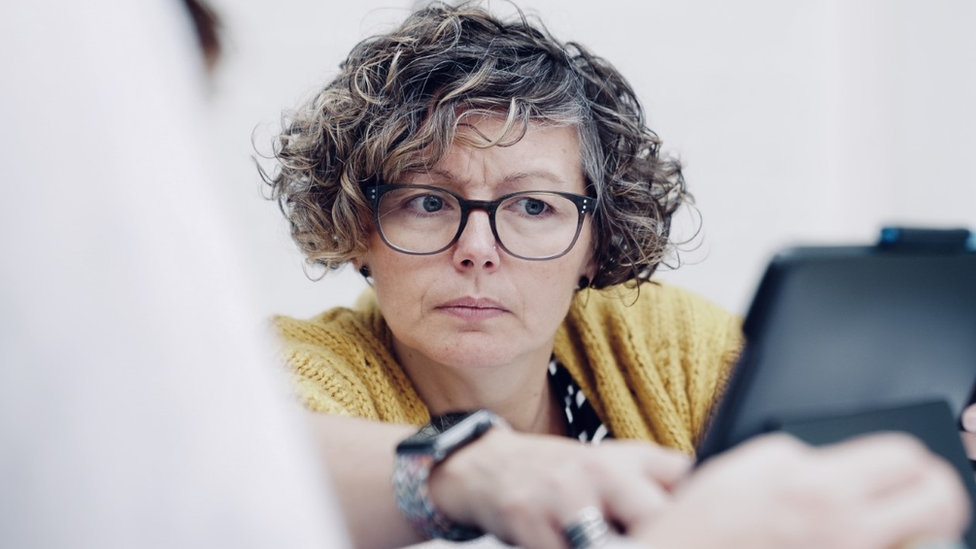Government in court for no sign language at Covid briefings
- Published

Lynn Stewart-Taylor founded the Where Is The Interpreter campaign
The government is being taken to court today by 276 deaf people over the lack of British Sign Language (BSL) interpretation at the televised coronavirus briefings.
The hearing at the Royal Courts of Justice in London will see a judge decide if the complainants are entitled to compensation.
Campaigner Lynn Stewart-Taylor says the lack of provision during the pandemic made the deaf community feel "excluded" and "like we're an afterthought."
The government says they "established BSL interpretation at the No10 Covid press conferences via the BBC News channel."
The case is being heard on Friday September 23 - which happens to be International Day of Sign Languages.
A judicial review last year found that out of over 173 Covid briefings to the date of the review, two were unlawful because BSL was not provided on screen.
But Ms Stewart-Taylor, who founded the campaign group #WhereIsTheInterpreter at the start of the pandemic, told the BBC's Access All podcast that the first nine Covid briefings in March 2020 had no BSL interpreter present.
Speaking through a BSL interpreter, she said that the deaf community did not initially know how serious the pandemic was - because they just weren't being told, which was "terrifying".
The remaining ministerial briefings had an on-screen interpreter superimposed on the screen which was available on the BBC News Channel, iPlayer and later on Government social media channels.
But Ms Stewart-Lynn argues that this meant deaf people could only find out what was happening if they used the BBC.
Ms Stewart-Taylor says it should not be up to individual broadcasters like the BBC to provide the service, but for the government to provide a BSL interpreter and in the room next to speakers so that the original live televised stream and all follow up news reports and clips will always have a signer present.
Scotland, Wales and Northern Ireland had in-person interpreters at their devolved briefings from the outset, and so circumnavigated the issue.

Listen to Access All on BBC Sounds
In the latest episode of Access All, presenter Nikki Fox discusses the on-going BSL court case with campaigners Lynn and Liam. There is a full transcript available.
We also hear from actor Leo Long, the star of the new Netflix film, I Used To Be Famous, on being neurodiverse and playing the role of an autistic drummer.


Liam O'Dell, a deaf and disabled freelance journalist who has been following the case says: "There's a real sense from the government that they're just not taking this seriously.
"Conferences are still happening where interpretation is not being provided there in person. But if it's in person you don't have to worry about it being just on a BBC channel, because it's accessible by default.
"A recent example is Liz Truss stood on the steps of Downing Street, making her first speech as Prime Minister and there was no BSL interpreter next to her.
"So there's a sense the Government still doesn't get it. It's not about the compensation, it's merely a more punitive measure to hit the Government a little bit financially and to say: 'Look, this is what will happen if you keep treating deaf people as second-class citizens.'"
Many deaf people who use BSL as their first language say they cannot rely on subtitles because for them, English is their second language and the average reading age for deaf people is often reported as being around nine years old.
The issue has been rolling through the courts for some time.
In a case from July 2021, a deaf woman won a claim against the government after a judge found a lack of sign language at two televised Covid briefings had "served to disempower, to frustrate and to marginalise".
Katie Rowley, then 36, from Leeds, started court action after the events went ahead without interpreters on screen.
The government denied breaching its legal obligation to make broadcasts accessible to deaf people.
But in his ruling, a judge said the lack of provision constituted discrimination.
Ms Rowley is one of the 276 deaf people bringing action against the government in this most recent court case. She uses BSL as her first language and is also dyslexic - making English language subtitles doubly difficult to read.
"I am a slow reader - so that means when I was reading the subtitles, I would miss so much information and [it] would just mess up my head. It would be so difficult - it became impossible," Ms Rowley previously told the BBC through an interpreter.
A government spokesman says: "We are committed to supporting disabled people and established BSL interpretation at the No10 Covid press conferences via the BBC News channel and iPlayer, available on all TV packages as part of Freeview."
If the government is successful in today's hearing, the case will be struck out, although claimants will be able to appeal.
If the campaigners are successful, the case could end up going to full trial.
If the judge rules in their favour, it will then be decided later how much compensation to award.
"We're in 2022, and we expect to be part of that wider community," says Ms Stewart-Taylor. "To be accepted for the language we use, the culture we have, and so [this case] is about recognising us as a part of the wider community."
You can listen to the podcast and find information and support on the Access All page.
